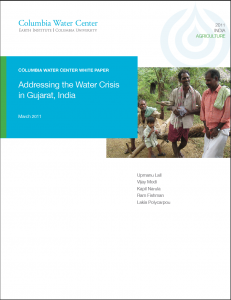Energy47
-

White Paper Release: Addressing the Water Crisis in Gujarat, India
In honor of World Water Day, Columbia Water Center is releasing a new White Paper: Addressing the Water Crisis in Gujarat, India. The paper presents the results of Columbia Water Center’s study of the severe groundwater crisis in the Mehsana region of Northern Gujarat, India. The study concludes that the current pattern of groundwater exploitation…
-

Ethanol’s Impacts on Our Water Resources
Ninety-five percent of ethanol in the U.S. comes from corn, but corn-based ethanol is controversial because of the amount of land required to grow the crops, and because of its effect on food prices and water resources.
-

Climate News Roundup: Week of 3/13
Untapped crop data from Africa predicts corn peril if temperatures rise, EurekAlert, Mar. 13 Stanford agricultural scientist David Lobell and researchers at the International Maize and Wheat Improvement Center have found that data from 20,000 experimental crop trials in sub-Saharan Africa show a clear negative effect of warming on corn production. Their research indicates that even…
-

Still Time to Apply for Certificate in Conservation and Environmental Sustainability Program
There is still time to apply for classes in Module 3 of the Certificate in Conservation and Environmental Sustainability Program.
-

Finding Answers to the Worsening Water Crisis in Gujarat, India
As explained in a recent blog post, falling groundwater levels in the Northern regions of the state of Gujarat, India, are reaching dramatically dangerous proportions. Columbia Water Center (CWC), however, believes that there are numerous technologies and practices that could save significant amounts of water and energy. Farmers have shown interest in applying them, but…
-

Hope for Biofuels in ‘Oilgae’?
With growing concern over the ethics and efficiency of first generation biofuels (see here), interest has increased in third generation, or algal, biofuels. Some, however, question the technology’s real-world potential, and call publicity surrounding investments in the technology, such as this Exxon Mobil TV commercial, “green-washing.” To help properly assess the debate, here’s an overview…
-

Desalination: Yesterdayʼs Solution (part 3)
Worldwide, humans have quickly and wastefully consumed water from the cheapest sources by over-pumping aquifers and over-allocating rivers. Weʼve turned to technology to eek out more but technology is not without its costs. Every remaining incremental gallon of water will come at a higher and higher price. Are we nearing a breaking point?
-

Despite Grim Water Futures, China and US Discuss Everything but Water
Notably absent from this week’s program is any planned dialogue regarding energy demand and water supply, two issues whose inverse trajectories are threatening the environmental and economic futures of both nations.
-

Desalination: Yesterdayʼs Solution (part 2)
Everyone has skeletons in their closets, desalination is no exception. Burying them does a disservice to the millions of public dollars that have been invested. Letʼs celebrate their weaknesses so that we may never repeat their mistakes. There may be many dozens of such projects, but here are a few that have experienced their share…

By studying thousands of buildings and analyzing their electricity use, Columbia Climate School Dean Alexis Abramson has been able to uncover ways to significantly cut energy consumption and emissions. Watch the Video: “Engineering a Cooler Future Through Smarter Buildings“
